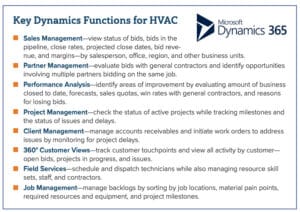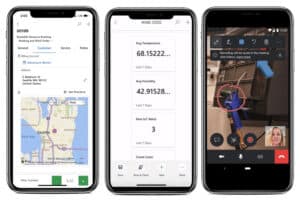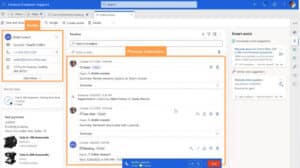Field Service Management for HVAC
With the right field service stack, commercial HVACs can optimize resources, win big with customers, and fuel sustainable, long-term growth.
Table of Content
Commercial HVAC companies have always managed a dizzying array of moving parts: inventory and assets, warranties and SLAs, service fleets and subcontractors – plus a long roster of customers with complex projects and a whole lot of cash on the line.
In 2023, the “basic facts” of commercial HVAC remain the same. However, a lot has changed within the last several years.
Customers expect more from providers. Eight-hour service windows and hidden expenses are no longer acceptable. Because HVAC systems consume more energy than any other commercial appliance, they’re also demanding more transparency and accountability from providers, as well as heating and cooling solutions that help them meet their own sustainability targets.
Inflation and ongoing supply chain disruptions are also forcing HVACs to rethink resource management strategies and explore new sources of revenue.
In this article, we’ll explain how, with the right field service stack, commercial HVACs can optimize resources, win big with customers, and fuel sustainable, long-term growth.
Commercial HVAC companies face countless challenges when it comes to managing assets, processes, work orders, sales, customers, and everything else.
They need a comprehensive “command center” to improve efficiency, service quality, and profitability – in the field, the office, and anywhere else work gets done. Field service management solutions are an important part of that command center, uniting field-based work with the rest of the business.
In these next few sections, we’ll look at some of the broader benefits FSM tools can offer.
Without a unified system that can provide end-to-end visibility and real-time, AI-driven insights, orgs lack the data they need to understand what’s working (or not), make profitable decisions, and take proactive action when something needs to change.
Knowing what our clients are up against, Velosio’s field service experts help HVAC orgs build all-in-one FSM platforms using familiar Microsoft apps and services.
Below, you’ll find a screenshot from our commercial HVAC eBook, listing the core capabilities that belong in your “average” tech stack.

Now, every business has different needs and requirements, so you might add, eliminate, or replace some of the modules on this list.
Our point here is that HVAC orgs need to build a platform that supports all business units, processes, and end-user roles.
Perhaps more crucially, the field service solutions you choose must be embedded into your core ecosystem. Tacking an FSM integration onto your existing ERP only creates more silos, defeating the purpose of that investment.
As an example, look at the SECO/WARWICK Group. The Polish company has been building furnaces and heating solutions for more than a century, serving commercial clients across 70+ countries.
Within the past few years, SECO/WARWICK started bumping up against the limits of the analog processes and siloed legacy solutions long used to manage day-to-day operations.
SECO/WARWICK worked with a Microsoft partner to migrate on-prem operations to the cloud-based Dynamics 365 ERP platform, allowing them to establish a single source of truth across the entire organization.
Director of Automations, Sławomir Wachowski told Microsoft that gaining end-to-end visibility was a real game-changer.
He explained that locating information about customers and orders had become increasingly time-consuming and difficult. Project managers, sales teams, and the frontline staff processing orders were all working from different data sources and using different apps and services to do their jobs.
All of those silos, Wachowski says, made it really hard to respond to incoming orders and queries.
The company built a new stack – using D365 Field Service, Sales, and Customer Service modules as the foundation. MS solutions like Power BI, SharePoint, and Teams helped them facilitate org-wide collaboration and deliver role-specific insights to all end-users.
Here’s a basic visualization showing how that move from on-prem to a unified, cloud-based D365 solution gave SECO/WARWICK the deep customer insights they needed to improve service and save 20-30% of time spent on daily tasks.
D365 Field Service comes pre-loaded with several features that allow commercial HVACs to optimize existing resources on multiple fronts.
Users can view all resources, locations, and open work orders from a single dashboard, allowing them to streamline service calls, automate scheduling, and optimize processes for handling ad-hoc projects, service contracts, and routine maintenance calls.
Here’s a look at D365’s Scheduling Board, which allows users to manage assignments manually using its built-in drag-and-drop editor or automatically with its AI Schedule Assistant.

FSM tools also allow HVACs to track the location, condition, and maintenance history of each asset, making it easier to plan and execute service calls.
On the backend, Dynamics 365 helps orgs streamline work order management and backlogs. Users can leverage baked-in AI to prioritize customer requests based on predefined parameters such as urgency, recency, availability, and SLA terms.
Service managers can assign work based on factors like skills and availability, as well as coordinate bookings with real-time ETAs for equipment and parts.
But, we should mention that optimization goes way beyond field service-specific solutions.
Chances are, you’ll need to invest in solutions that support other parts of the business-like customer support, project management, manufacturing, logistics, finance, etc.
While most FSM software includes robust reporting and analytics capabilities, they won’t do much for your business in isolation. Again, it’s all about that ecosystem.
Dynamics 365 D365 Field Service builds on the capabilities found in D365 Finance (Microsoft’s core enterprise ERP) and integrates seamlessly with Project Operations, Sales, and Customer Service modules.
You can integrate D365 FS with D365 Supply Chain Management to track inventory, assets, and tools needed for each service call. “Smart” technology like IoT sensors and real-time data streaming brings even more value to the stack, allowing HVACs to embrace proactive service models and move the needle toward sustainability targets.
Project managers can use data from D365 Field Service to monitor profit margins and track the progress of each project – and all of the materials, milestones, and players involved – from the Project Ops dashboard.
Business leaders can view metrics like average response time, CSAT scores, and completion rates alongside other critical KPIs to forecast future resourcing needs, set budgets, and make profitable strategic decisions.
Improving service operations requires HVACs to think holistically, rather than focusing exclusively on things like customer communications or sales strategies.
It’s about empowering everyone with a hand in driving customer experiences – support staff, sales, C-suite leaders, and, of course, your technicians.
Dynamics 365 Field Service comes with a mobile app that makes it easy for techs to deliver efficient, high-quality service – giving them on-demand access to the tools and support they need to succeed in the field.

Techs can use the app to view open work orders, customers, and assets, as well as submit reports and update records in real-time, while on-site with the customer.
The platform also provides offline support, allowing techs to view orders, upload notes and photos, and fill out reports or inspections. When they’re back online, updates automatically sync back to the main system.
HVACs using Connected Field Service (the IoT layer for D365 Field Service) gain access to insights that further enhance service quality and efficiency.
Orgs can create work orders using real-time data from sensor-enabled assets, understand repairs in-context, and send commands to connected devices to troubleshoot remotely.
HVACs can also implement solutions that make it easier for service reps to help customers and for customers to help themselves.
With D365 Customer Service, you can create self-service portals that allow customers to submit service requests and schedule appointments, as well as track progress on open orders.
Agents get a boost from 360-customer views and built-in AI that recommends the actions and resources most likely to produce the desired outcome.

Technology is obviously a critical priority for all commercial HVAC distributors and service providers. But, it’s also important to understand that success is about more than a few choice investments.
Velosio’s field service experts bring decades of experience working with Microsoft solutions, commercial HVAC clients, and running field operations themselves. We can help you migrate to the cloud, consolidate siloed operations, and continuously adapt IT solutions and strategies to achieve long-term success.
Talk to us about how Velosio can help you realize business value faster with end-to-end solutions and cloud services.